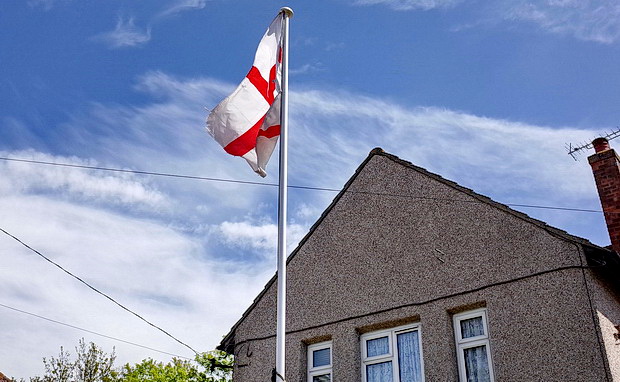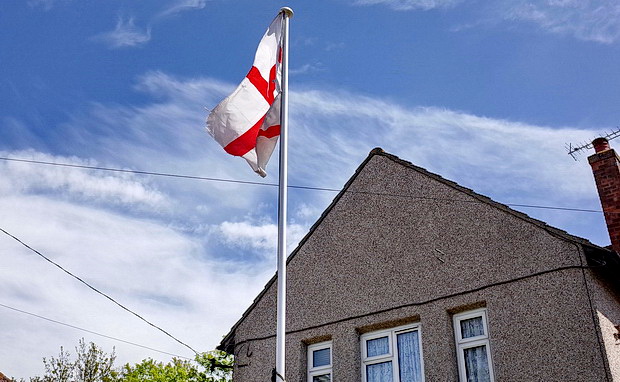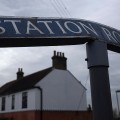
Here’s a short selection of photos taken in and around Stanford-le-Hope and Corringham, located within the unitary authority of Thurrock in Essex.
Stanford-le-Hope is some 24 miles from London, and Corringham another two miles east.
Stanford-le-Hope’s station is on a loop line on the London, Tilbury and Southend Railway, with direct trains to London Fenchurch Street. The station opened in September 1854 with the name Horndon, and was rebuilt during the 1960s.
It’s not the most attractive route to travel along.
There’s an unmanned level crossing at the eastern end of the station.
Stanford-le-Hope is a commuter town for London, although residents also work at the former oil refinery at Shell Haven, which is now used as a seaport, warehousing and distribution centre and goes under the snappy name of the DP World London Gateway Logistics Park.
The Railway Tavern on King Street describes itself as a,”Town pub dedicated to sport and music. Good atmosphere, decent beer.” And that sounds fine to us.
On The Green can be found the Computer Doctor, a barber’s shop and Loakmans hair salon.
The striking St Margaret’s Church is a Grade 1 listed building, standing on rising ground in the centre of the village.
A local history site tells its story:
The walls are constructed mainly of ragstone rubble with some flint, with dressings of Reigate limestone. The present church seems to date from c.1180. This late Norman building was soon enlarged by adding a south aisle and chantry chapel, followed by a north aisle in c.1280.
About 60 years later the south aisle was remodelled and the chancel extended eastwards. The original rather low tower was probably of this period also. The south porch dates from the 16th century, with modern alterations; the nail studded door is 400 years old.
There was knitted bunting all around the church and this rather strange life-size cut out of The Queen.
The Inn On The Green may look like a lovely country pub but things can get a bit spicy in there – in April last year it all kicked off big time with five people needing treatment for burns from a spray attack and a 54 year old woman suffering a broken arm.
Three years before, two people were slashed in the face and neck in an attack linked to people drinking at the pub, and that’s not the only trouble this charming-looking boozer has attracted.
The rather more tranquil Hadfield Stores, a short walk away. Shame about the modern shopfront but the wooden sign above is lovely.
Suburbia.
One of Stanford’s self proclaimed “Blooming Marvels,” a flower bed planted and maintained by community volunteers.
Delightful architecture.
A cyclist passes by.
Possibly the Rainbow Stores. Or maybe the Rambow Stoes.
We were walking to East Thurrock’s football ground in Corringham, and this involved a less than pleasant stroll alongside a dual carriageway.
Industrial countryside.
Behold! Ye Olde Mediaeval House!
Looks like the child had grown up en route.
Even in the middle of the countryside you can be sure to encounter an abandoned shopping trolley.
Corringham boasts a parish church that originated in the Saxon period, with the town formerly served by the Corringham Light Railway, which connected the Kynoch munitions factory with the London, Tilbury and Southend Railway.
Despite its small population of around 9,000 souls, the town has made a bigger than expected contribution to the music industry, being birthplace to contemporary classic composer Mark-Anthony Turnage, Culture Club’s Roy Hay, Dougie Poynter from McFly and hip hop artist Dan Le Sac.
East Thurrock’s ground is located right next to this beautiful Saxon church, with The Bull pub just a few yards further on.
A curious pair of bedfellows.
The Bull Inn is one of the oldest houses in Corringham, with its original structure dating back to the 1600s, and after my football team (Dulwich Hamlet) had lost their play off final, a visit was needed.
The pub website reveals the pub’s history:
The Bull Inn is one of the oldest houses in Corringham.Its history is vast, but it is original structure dates back as early as the 1600’s. The cross wing on the south with its overhanging gable is the oldest part to the building approximately 500 years old however, the main part dates back to the 17th century.
The chimney stack, made of handmade bricks, is set diagonally across the bar together with a substantial oak beam said to date back to 1627. The two ancient fire places were renewed and restored in 1837. There was formally a Dormer window in the roof, but it was demolished when the roof was retiled after a bomb dropped in the courtyard in 1940.
The Bull was originally associated with smugglers, as the pubs direct location was conveniently positioned between a quiet path between Fobbing, Vange and Pitsea marshes, allowing trade of the contraband to be undetected. Later through history, it is thought that the location of The Bull would also be identified as a pilgrims root for travellers wishing travel the Thames to visit the shrine of Sir. William of Perth, found to be in Rochester.


